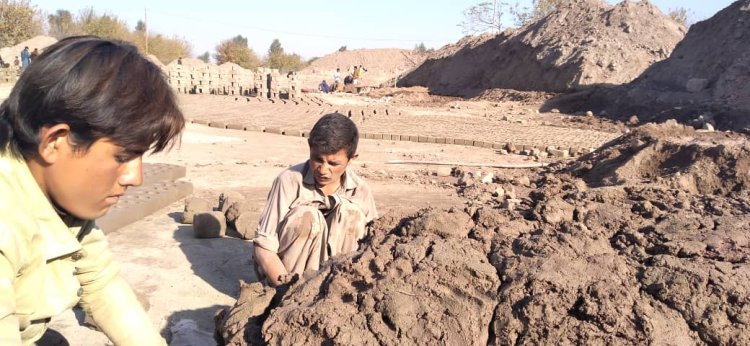Brick-makers at Deh Sabz, Kabul: Children Trapped in Poverty and an Uncertain Future

In Kabul’s Deh Sabz district, numerous working children—many of whom have never had the chance to attend school—wake up before sunrise to head to the brick kilns. Their sleepy faces, dry lips, hopeless eyes, and tired expressions reflect the silent stories of children born into hardship.
For years, Ferdaws has worked in the kilns alongside his four children. Every morning, he sends his three sons and one daughter to labor in the brickworks.
His eldest son is 14, and along with his daughter, all of the children have grown up in the kilns. His hair has turned white from years of toil. “My sons are still small and not strong enough for heavy work,” he says, “but poverty has left us with no other choice.”
Ferdaws explains: “My four children and I leave early in the morning to work in the kilns. My wife prepares food and brings it later because our home is close to the site. We’ve been doing this for years. Poverty forced us into this work, and my children couldn’t go to school. If they don’t help me, I can’t manage on my own.”
Living in a mud-brick house near the kilns, Ferdaws says he must earn enough before the summer ends to cover their basic needs.
With sweat pouring down his face and exhaustion written across his features, Ferdaws says that during winter, kiln contractors give families a fixed amount of money in advance—then expect them to work during the warm season to repay it.
“I borrowed 60,000 afghanis last winter for my wife’s treatment,” he says. “We took her to Pakistan, and after medical tests, they diagnosed her with severe jaundice. Now that the weather is warm again, I have to repay that loan this season. If I don’t, they won’t hire me next year.”
He adds that many poor families survive winter by taking loans from kiln owners, but they often remain trapped in debt—year after year.
Ferdaws works under the sun all day and returns home in the evening, completely worn out. He says life has been so hard that he never had a chance to study, and now neither do his children.
“Poverty kept me and my children away from education. We work in the kilns during summer and sell goods in the city during winter. There’s never a chance for school. But if God helps me solve my financial problems, I’ll send my daughter and the rest of my children to school.”
Hundreds of children in the brick kilns are deprived not only of schooling but of other basic rights. Children who should be in classrooms are locked instead in a cycle of poverty and forced labor.
Nine-year-old Shamshad, Ferdaws’ son, says his hands and legs ache every night from work. “I help my father and brothers with filling molds and mixing clay. I come here every morning with my father. I haven’t been to school—but I want to study. I want to escape this job.”
Psychologists warn that when children are deprived of rest and pushed into hard labor, it damages their mental health and motivation. They stress that the future of society depends on its children—and if they are not safe and supported, society itself may fall apart.
Across Afghanistan, thousands of children are forced into heavy labor because of poverty and economic hardship. Many are deprived of school and denied their most basic rights.
